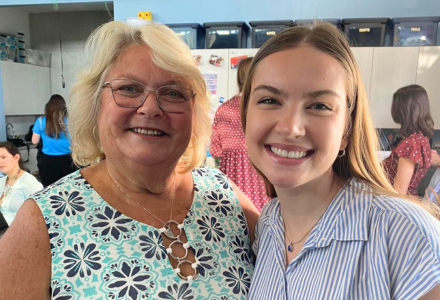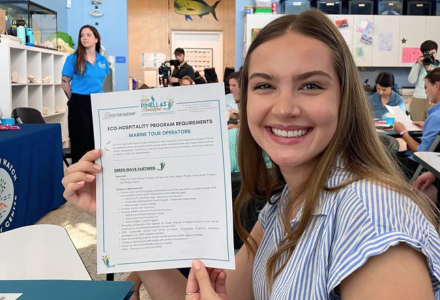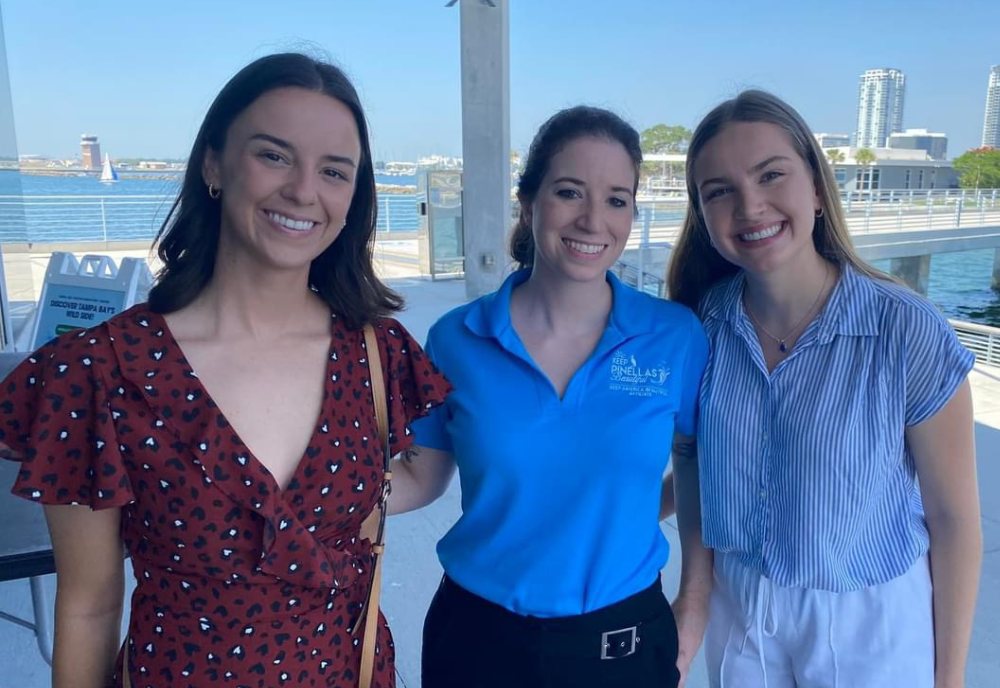From the classroom to fieldwork, University of South Florida Judy Genshaft Honors
College student Marza Hiatt has been making waves in sustainable tourism through an
internship at USF and collaboration with the environmental nonprofit Keep Pinellas Beautiful (KPB).
Hiatt, a sustainability studies major with minors in environmental science and policy
and urban studies at the St. Petersburg campus, enrolled in Dr. Brooke Hansen’s Honors
course, Destination Stewardship. After completing the course, Hiatt secured an internship
with Professor Hansen, which led to her presenting at Keep Pinellas Beautiful’s Better
Boating Breakfast series at the Discovery Center. As an undergraduate assistant, Hiatt
then collaborated with the KPB Hospitality Eco-Partnership Program to promote sustainable
tourism concepts.
Inspired by her hometown in Pine Island, Florida, Hiatt is interested in investigating
core sustainability efforts like renewable energy, conservation, preservation, recycling,
composting, gardening, and tourism. Her long-term goal is to create a world that promotes
environmental stewardship and equity to support a circular economy and healthy living
for all.
Upon completion of her internship, Hiatt shared her experiences and offered advice
to USF and Judy Genshaft Honors College students looking to make an impact.
Q: What inspired you to take the Honors class Destination Stewardship with Professor
Hansen, and how did the class help you grow professionally?

My major is what inspired me to take the Honors class! I was so happy to see an Honors
class so close to my passion was being offered. What is so great about the Honors
college is that there are a multitude of different classes that are fit for anyone
and their interests. It fosters an interdisciplinary environment that is key in educational
and professional development.
Q: How does the class relate to some of the strengths of the St. Petersburg campus?
There is such a large emphasis on community on not just the St. Petersburg campus,
but also the Honors College. What the St. Petersburg campus does really well is its
promotion of a breakdown of barriers. While we are college students working on our
education and attaining our degrees on a smaller campus, we are also a part of a large
community beyond the classroom that can be found in the surrounding city. The Honors
College on the St. Petersburg campus does an excellent job of breaking that barrier
of classroom to community and immersing students into the real world, finding connections
outside of the college itself, and working to create a common goal that many residents
share.
Q: What did you learn from the Keep Pinellas Beautiful collaboration?
I always knew that getting people on board with sustainability can be difficult, but
through this process, I learned that one of the most challenging parts is actually
getting the audience to begin with. While we had a lot of success with the three events
we hosted, we had some difficulty in the marketing process. KPB is really successful
in their volunteer and clean-up programs, but since this is such a different program
for them and their current audience, it was challenging expanding that in the beginning
stages. What really makes an impact is directly speaking with the target audience
– in this case marine tour operators – and telling them our goals, what our events
are, and personally inviting them so they feel respected and heard in their concerns.
Q: How did it feel presenting with Dr. Hansen at the Discovery Center?

Dr. Hansen is a wonderful presenter and is so fun to present with! She really fosters
a work environment in which all voices are heard and collaborative effort is prioritized.
She made me feel completely comfortable and prepared to present. She is also a fierce
advocate for education, which made the presentations that much more invigorating,
not only for me as a fellow presenter, but also for our audiences.
Q: What advice do you have for Honors students who are looking to make an impact?
My main piece of advice for pretty much any student is to not be afraid to look stupid.
Oftentimes, our fears are what hold us back from speaking up, asking questions, and
contributing to things both inside and outside the classroom. Once I started working
on the fear of looking stupid, I realized that there is so much benefit from contributing
to conversations and projects. I also had a difficult time contributing in a room
of professionals as a student. It can be challenging to find your place in something
like this when you are a working college student, but it is so important to realize
that we are all learning!
